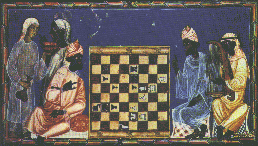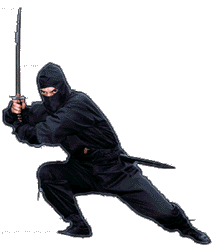 |
 |
 |
 |
 |
 |
 |
 |
 |
 |
 |
 |
 |
 |
 |
 |
 |
 |
 |
 |
|
|
|
|
|
|
|
|
|
|
|
|
|
|
|
|
|
|
|
|
|
|
 |
|
|
|
|
|
|
|
|
|
|
|
|
|
|
The Socio-Politics of the First Move in Chess
by Daaim Shabazz, Ph.D.
|
|
|
|
|
|
|
|
|
|
|
|
|
|
Chess is a game of perfect duality… a game of opposites… a game of dyadic dynamism. Its dynamism is what makes chess so intriguing. However, there is a point of chess that has been taken as an accepted truth... black has to fight to restore equilibrium and is thus at a natural disadvantage. All of this stems from the fact that white (or the lighter color) has the first move.
We often hear that a player must win with white and be happy to draw with black. Is this based on the sample of games that have been played thus far? Is this a concrete truism or a mere perception shaped by how the game has been presented to the chess-playing public? Saying that white has the advantage is easy, but can we truly deduce that it is due to the first move?
|
|
|
|
|
|
|
|
|
|
|
|
|
|
Racial Politics on First Move?
Historically, chess has gone through a metamorphosis, but the origin of white moving first is not known. The game was brought to Europe by the Moors of Africa during their 800-year rule. However, little is known about chess in Moorish Spain. Much of the literature was probably burned by the Spaniards after the Moors were driven out in the 15th century. It was then that the game of chess was remade into the game we play today.
|
|
|
|
|
|
|
|
|

|
|
|
|
|
|
|
|
|
|
|
|
Moors playing chess in Spain
|
|
|
|
|
|
|
|
|
|
|
|
|
|
|
|
|
Some argue that there are serious racial overtones in the game of chess stemming from the above historical footnote. Psychiatrist Dr. Frances Cress-Welsing of The Isis Papers fame has used chess as a metaphor to describe racism within the context of her social "color-confrontation theory." While Dr. Welsing's theories have been long debated, there are some interesting truisms in the chess metaphor.
We have all seen the problem books replete with entire compilations of "white to play to mate," or "white to play and win" problems. Most chess books and software are presented from the perspective of the reader having the white pieces. Do these notions provide white with a perception of superiority? Perhaps history may suggest that at the time these rules were made, there may have been a symbolic message conveyed. These traditions have been carried on without much thought. However, we need to examine the historical context to get more details. Let us examine more technical aspects of color allocation.
|
|
|
|
|
|
|
|
|
|
|
|
|
|
Is Chess a Fair Game?
In chess tournaments, each player gets a color allocation and it usually alternates. The notion of having the "advantage of the white pieces" is well-known. There have been many discussions on white's superior results which ranges from 52-55%. Since white moves first and all other rules are equal, many deduce that the first move offers a tangible advantage. Of course, we will see that this argument can be tested.
Many boil the first move advantage down to notions such as tempos and white's aforementioned percentage of victory. However, chess games are not linear and do not follow a uniform pace throughout the game. There are many tempos lost and gained by both sides in the course of a game. The pace ebbs and flows; the advantage swings back and forth.
|
|
|
|
|
|
|
|
|

|
|
|
|
|
|
|
|
|
|
|
|
White scores approximately 55% with the white pieces and many attribute this dominance to the first move privilege. Is it that simple?
|
|
|
|
|
|
|
|
|
|
|
|
|
|
|
|
|
As the game changes its character, the importance of the first move may have long lost much its relevance to the position. In fact, black has as much right to determine the character of the game. If chess were merely decided by tempos, openings like the Center Counter would not be playable at all. Notwithstanding, there is something psychological about how we view the colors we play. Given the accepted notions, playing white is supposed to be an advantage.
Ever notice that novice players gleefully grab the white pieces and go into games with an attitude to win with white? Players with white sometimes feel they can magically win against players several levels above them. There is a psychological component that we do not realize. Even top players play into this notion. Most top players often state "a draw with Black is OK." Yet, a player like Bobby Fischer appeared to carry no such notion regardless of the competition. The object of chess is to win a given game and the notion that we are only attempting to equalize with black may translate into a poorer psychological outlook when playing.
|
|
|
|
|
|
|
|
|
|
 |
|
|
|
|
Perhaps the advantage of white's first move was more evident when most games took on a more symmetrical character, but hypermodernism has had a profound impact on the nature of chess.
|
|
|
|
|
 |
|
|
|
|
|
|
|
|
|
|
If it is said that white has "first mover advantage," then theories of martial science based on countermeasures and counterattacks are debunked. In martial science, art and warfare, one does not necessarily say that the person who throws the first blow or fires the first shot has the advantage. As in chess, it is also true in warfare that having the advantage depends on many factors… terrain, size and strength of respective armies, access to resources, preparation, stealth, strategic and tactical acumen, etc. In fact, moving first could be a disadvantage. Who moves (or strikes) first is not as important as much as whether the player moving second has adequate countermeasures, or even evasive techniques. That is what makes chess so intriguing and most of all, a fair game.
Black is Good (without the first move)!
Overall strength of an army makes a difference in the outcome of warfare. It is often said that a chess game played at the highest levels should be a draw. If that is the case, then what happened to the first mover advantage? If we accepted this advantage, what does white's win percentage represent? Is it a constant 7-8%? Can black narrow the gap? It just so happens that we have approximately 2-3 million games recorded. This is a very small sample relative to the "reasonable" possibilities for chess.
|
|
|
|
|
|
|
|
|
|

|
|
|
|
|
|
|
|
|
With the advent of Internet chess and the millions of games being played daily, we will arrive at more balanced play. As we evolve, we will find that there will be points in history where black will experience an increasingly higher percentage of wins with more improvements in theory. As the sample of games increase and the knowledge and experience of these encounters become assimilated, it will become more difficult to win. Thus, the percentage will even out. It is simply the dyadic law of chess, or we would be playing an unfair game.
|
|
|
|
|
|
|
|
|
|
|
|
|
|
In the past, most of the research we have found is skewed in finding advantages and attacking systems for white. Over the past 50 years, black has found resources to fight for initiative. Since the object in chess is to win, any other notion is self-defeating. Perhaps the advantage of white's first move was more evident when most games took on a more symmetrical character, but hypermodernism has had a profound impact on the nature of chess. If you look at lines in the Sicilian Sveshnikov, Sicilian Dragon, Sicilian Najdorf, King's Indian, Benko Gambit, the Marshall Gambit and other fighting systems, do practitioners of these lines say they're trying to equalize? Of course not!
Exploring Options
White is currently scoring 52-55%. Is this percentage only relevant in the common starting position? If chess is a true game, we should also ask if the first move would yield the same advantage in all 960 positions in Fischer Random. Would the win-loss percentage change as the beginning position changes? Would the winning percentage swing in black's favor if its player was awarded the first move? It would be interesting to see whether the player playing white would continue to perceive an advantage despite the rule change.
While I contend it does not matter who moves first (if chess is fair), it would be interesting to see the reaction. Recently, I sat down to play a casual game of chess and the other person said, "Oh… here we play black moves first." Strange, I thought… but I obliged. Since the board is now mirrored, I was disoriented to say the least. I was playing white and promptly dropped a piece to a pawn fork on forgetting that the system I played does not work with the queen and king position reversed!! I later complicated the position, got a strong attack and ended up mating my opponent.
These types of options are the future for chess. Randomizing the color allocation (choosing which color moves first) would be interesting but would create pairing issues. National Master Lionel Davis has discussed these issues in what he calls "ultramodern chess"… that is black moving first (see blog topic). I would add that Fischer Random will be the game of the future.
Composed: 24 January 2008
Blog this topic!!
|
|
|
|
|
|
|
|
|
|
|
|
|
|
|
 |
|
|
|
 |
|
|
|
|
|
|
|
|
|
|
|
|
|
|
|
|
|
 |
|




